|
|
|
Sort Order |
|
|
|
Items / Page
|
|
|
|
|
|
|
| Srl | Item |
| 1 |
ID:
148603
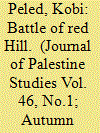

|
|
|
|
|
| Summary/Abstract |
This article explores the relations between inhabitants of the Upper Galilee village of Mi'ilya and soldiers of the Arab Salvation Army (ASA) in the months leading up to the conquest of the village in October 1948. Using interviews conducted in Arabic with surviving elders from Mi'ilya as well as contemporaneous Hebrew documents preserved in the archives of the Israeli army, the article aims to construct an integrated historical narrative of events. Throwing light on little-known figures of the ASA, the study uncovers the complex web of relationships that emerged in the day-to-day interactions of the ASA volunteers with the Palestinian villagers they were sent to defend. Particular emphasis is placed on the battle of Red Hill, now mostly forgotten, which took place almost three weeks before the fall of the village, mobilizing ASA troops, members of the local militia, and residents of Mi'liya in a joint effort to fend off encroaching Israeli forces.
|
|
|
|
|
|
|
|
|
|
|
|
|
|
|
|
| 2 |
ID:
192253


|
|
|
|
|
| Summary/Abstract |
This article describes Israel's bacteriological warfare campaign during the first Arab-Israeli war of 1948. Over the decades following that war rumours circulated that Israel had used bacteria, alongside conventional weaponry, in its battle against Palestine's Arabs and the surrounding Arab states. The declassification of files in the Israeli military archives, our discovery of a crucial letter in private hands, and the publication of a handful of memoirs relating to 1948 have enabled us to bridge the divide between rumour and fact; to explain the campaign's origins; to reconstruct its stages, beginning in April 1948; to identify who was involved – including Israel's prime minister, David Ben-Gurion and the Israeli army's de facto chief of general staff, Yigael Yadin, as well as leading Israeli scientists – and who actively opposed it; and to delineate and assess what the campaign actually achieved or failed to achieve. In sum, this study helps to understand various aspects of the 1948 War.
|
|
|
|
|
|
|
|
|
|
|
|
|
|
|
|
| 3 |
ID:
171051
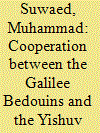

|
|
|
|
|
| Summary/Abstract |
During Israel’s War for Independence, the Bedouin tribes did not have a united attitude: Some tribes, who built good relations with the Jewish population, supported the Jewish side and fought with them, whereas other Bedouins tribes considered themselves part of the Palestinian population and fought with them. There were also tribes that supported no side and kept neutral.This article focuses on the Galilee Bedouin tribes, who chose to cooperate with the Jewish Yishuv and fought on their side. The article explains the background on which the relations between the Bedouins and the Jews in Galilee were built at the end of the Ottoman era and during the British mandate. It also examines the mutual trust and friendship that had developed between the Jewish population and their neighbor Bedouin tribes, leading them to cooperate with the Jewish side and support their cause. It analyzes causal factors and historical events that led certain Bedouin tribes to fight against the Jews and support the Palestinian side, and the reasons tribes kept neutral in this conflict.
|
|
|
|
|
|
|
|
|
|
|
|
|
|
|
|
| 4 |
ID:
160042


|
|
|
|
|
| Summary/Abstract |
The present paper attempts to take a close look at the events surrounding the conquest of the Palestinian village of Mi’ilya in the 1948 war based on Hebrew-language documents in the Israel Defense Forces archive and interviews conducted in Arabic with elderly people living in Mi’ilya. Its aim is to explore how these two types of sources and the distinct cultures of remembrance which they represent may be combined to produce a new historical canvas, affording a broader and deeper picture than could be achieved based on the Israeli archive alone or on Palestinian memories alone. Our main concern has been to reconstruct the past, a task that has become particularly urgent as regards oral memories of the war. At the same time we seek to show how present-day cares weigh on our recollections of the past and affect their form.
|
|
|
|
|
|
|
|
|
|
|
|
|
|
|
|
| 5 |
ID:
073108
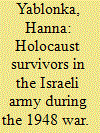

|
|
|
| 6 |
ID:
103230


|
|
|
|
|
| Publication |
2011.
|
| Summary/Abstract |
The number of Palestinian Arabs fleeing their homes during the 1948 war has constituted one of the most intractable bones of contention of the Arab-Israeli conflict, not least since the Palestinians have insisted on the 'right of return' of these individuals and their descendants to territory that has long been part of the state of Israel. At the end of the war, the Israeli government set the number of Palestinian refugees at 550,000-600,000; the British Foreign Office leaned toward the higher end of this estimate. But within a year, as large masses of people sought to benefit from the unprecedented influx of international funds to the area, some 962,000 alleged refugees had been registered with the newly-established UN Relief and Works Agency (UNRWA). More than a half-century later, these exaggerated initial numbers have swollen still further: as of June 2000, according to UNRWA, the total had climbed close to 3.75 million, though it readily admits that the statistics are largely inflated. For its part the PLO set a still higher figure of 5 million refugees, while Israel has unofficially estimated the current number of refugees and their families at closer to 2 million. Using a wealth of declassified Arab, Israeli, and British documents, this article seeks to provide as comprehensive and accurate an estimate as possible of the actual number of refugees in the wake of the 1948 war.
|
|
|
|
|
|
|
|
|
|
|
|
|
|
|
|
| 7 |
ID:
171052
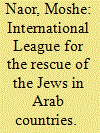

|
|
|
|
|
| Summary/Abstract |
This article discusses the campaign by the International League for the Rescue of the Jews in the Arab Countries (1948- 1950), formed by organisations representing Sephardi and Mizrahi Jews in Israel and the Herut party and aimed at preventing damage to the status of the Jews in the Arab states and promoting their emigration to Israel. The article will review the characteristics of the campaign, focusing on the public discourse it sparked in Israel around the idea of a population exchange between the Jews of the Arab states and the Palestinian refugees. This campaign, in which the memory of the Holocaust and the UN Convention on the Prevention and Punishment of the Crime of Genocide were employed, created a linkage between these two populations and expressed the political and social changes of this transitional period.
|
|
|
|
|
|
|
|
|
|
|
|
|
|
|
|
| 8 |
ID:
093976
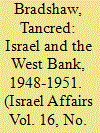

|
|
|
|
|
| Publication |
2010.
|
| Summary/Abstract |
This article accounts for Israel's failure to take the historical opportunity to invade the West Bank during the 1948 war. It also considers the nature of British support for Jordan between 1948 until the death of King Abdullah in 1951. British interests in Transjordan were determined by strategic factors that were outlined in the 1948 Anglo-Transjordan Treaty. Although the British were bound by the treaty to come to Jordan's assistance in the case of an invasion, in practice this would have been very difficult to achieve short of invading Israel from Egypt. This paper argues that the Israelis failed to invade the West Bank in 1948 because they were deterred by the possibility of British intervention and because of divisions within the Israeli political establishment.
|
|
|
|
|
|
|
|
|
|
|
|
|
|
|
|
| 9 |
ID:
174371
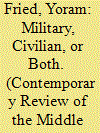

|
|
|
|
|
| Summary/Abstract |
Over the years, attempts to define the notion of national security in terms of what it means and what it represents have ranged from a classical, purely military definition, to a broader multidimensional concept encompassing a range of different features. Studies on Israel’s national security concept have tended to emphasize the formative role played by David Ben-Gurion, Israel’s first prime minister and defense minister. These works have focused on the military aspects of the national security concept, based on arguments concerning the perceived threat of wartime engagements with Arab armies. This article argues that Ben-Gurion’s national security concept was essentially a civilian perspective with military features that responded to the four types of threats, local, regional, international, and Jewish, facing the State of Israel at the time, most of which were not military.
|
|
|
|
|
|
|
|
|
|
|
|
|
|
|
|
| 10 |
ID:
116185
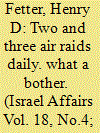

|
|
|
|
|
| Publication |
2012.
|
| Summary/Abstract |
In the summer of 1948, Charles F. Knox, Jr., a career American Foreign Service officer with no prior experience in Middle Eastern affairs, was assigned by the State Department to serve as Counsellor to the initial United States Mission in Israel. White House officials who had overcome State Department opposition to the recognition of Israel in May regarded Knox with suspicion. However, in the course of his service in Israel Knox transcended a Foreign Service milieu that was traditionally hostile to Zionist aspirations as well as his own negative stereotypes about the character of American Jews. The letters Knox sent to family and friends at home, as well as his official dispatches to his superiors in Washington, provide a vivid record of daily life in wartime Tel Aviv as well as a notably sympathetic portrayal of the Israeli people at war.
|
|
|
|
|
|
|
|
|
|
|
|
|
|
|
|
| 11 |
ID:
190992
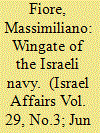

|
|
|
|
|
| Summary/Abstract |
This article tells the extraordinary story of Fiorenzo Capriotti, the man behind the sinking of the Egyptian flagship the Emir Farouk in October 1948 and the birth of the Israeli navy commando unit. Using the same unconventional technique that the Italian navy special assault unit Decima Flottiglia MAS had pioneered against the British in World War II, the embryonic Israeli navy was able to defeat Egypt’s superior numbers and weaponry. Not only did Capriotti play a key role in the founding of the Israeli navy commando unit, but he also made a significant contribution in shaping the doctrine that the Israeli navy should overcome the unfavourable balance of power through the superiority of its naval commando units. The sinking of Emir Farouk in fact consolidated the notion that the Israeli navy should compensate for its small size relative to most of its enemies through greater agility and firepower.
|
|
|
|
|
|
|
|
|
|
|
|
|
|
|
|
|
|
|
|
|